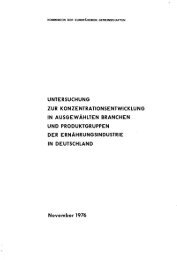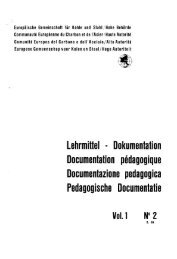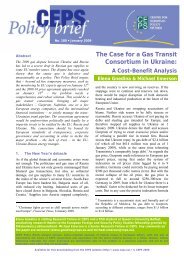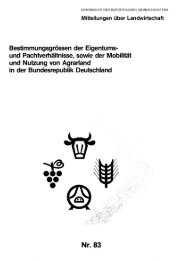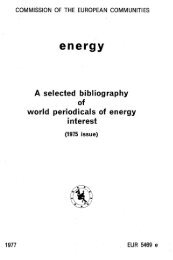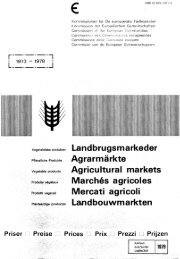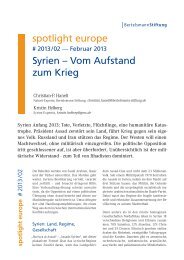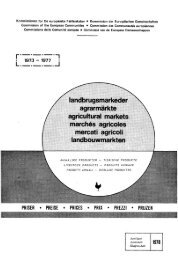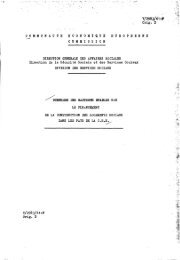Survey on Rules on Loss of Nationality in International Treaties and ...
Survey on Rules on Loss of Nationality in International Treaties and ...
Survey on Rules on Loss of Nationality in International Treaties and ...
Create successful ePaper yourself
Turn your PDF publications into a flip-book with our unique Google optimized e-Paper software.
SURVEY ON RULES ON LOSS OF NATIONALITY IN INTERNATIONAL TREATIES AND CASE LAW 19<br />
nati<strong>on</strong>al. Although the paternity <strong>of</strong> the Maltese man was established both <strong>in</strong> Scotl<strong>and</strong> <strong>and</strong> <strong>in</strong> Malta, the child<br />
was not entitled to Maltese nati<strong>on</strong>ality because he was born out <strong>of</strong> wedlock <strong>and</strong> not legitimised by<br />
subsequent marriage <strong>of</strong> the parents. A child born with<strong>in</strong> wedlock to a Maltese father or a child born out <strong>of</strong><br />
wedlock to a Maltese mother would have acquired Maltese nati<strong>on</strong>ality. This differential treatment could be<br />
qualified as discrim<strong>in</strong>ati<strong>on</strong> <strong>in</strong> the sense <strong>of</strong> Article 14 ECHR. However, a difficulty was that Article 14 ECHR<br />
is not a st<strong>and</strong>-al<strong>on</strong>e provisi<strong>on</strong>, but can <strong>on</strong>ly lead to the c<strong>on</strong>clusi<strong>on</strong> that the ECHR is violated <strong>in</strong> comb<strong>in</strong>ati<strong>on</strong><br />
with the observati<strong>on</strong> that a right protected under another provisi<strong>on</strong> is violated. Nati<strong>on</strong>ality is not directly<br />
protected by any other Article <strong>of</strong> the C<strong>on</strong>venti<strong>on</strong>.<br />
It was argued that the n<strong>on</strong>-access to the nati<strong>on</strong>ality <strong>of</strong> the father would c<strong>on</strong>stitute a violati<strong>on</strong> <strong>of</strong> the family life<br />
between father <strong>and</strong> child as protected by Article 8 ECHR. However, this claim was rejected due to the fact<br />
that the father <strong>on</strong>ly had a very cursory relati<strong>on</strong>ship with the mother <strong>and</strong> refused all c<strong>on</strong>tact with the child.<br />
Nevertheless, the ECtHR c<strong>on</strong>cluded there was a violati<strong>on</strong> <strong>of</strong> Article 14, juncto Article 8. The Court observes<br />
that the (n<strong>on</strong>-)access to the nati<strong>on</strong>ality <strong>of</strong> the father has an impact <strong>on</strong> the social identity <strong>of</strong> the child <strong>and</strong>, via<br />
this, <strong>on</strong> the private life <strong>of</strong> the child as protected under Article 8 ECHR.<br />
Of course, the direct c<strong>on</strong>sequence <strong>of</strong> the Genovese v Malta rul<strong>in</strong>g is that children born out <strong>of</strong> wedlock should<br />
have access to the nati<strong>on</strong>ality <strong>of</strong> a parent under precisely the same c<strong>on</strong>diti<strong>on</strong>s as a child born with<strong>in</strong> wedlock;<br />
if the family relati<strong>on</strong>ship is established, the c<strong>on</strong>diti<strong>on</strong>s for the acquisiti<strong>on</strong> <strong>of</strong> nati<strong>on</strong>ality iure sangu<strong>in</strong>is should<br />
be the same as for other children.<br />
However, it is evident that the rul<strong>in</strong>g <strong>in</strong> Genovese v Malta also affects cases <strong>of</strong> loss <strong>of</strong> nati<strong>on</strong>ality. A loss <strong>of</strong><br />
nati<strong>on</strong>ality has perhaps an even greater impact <strong>on</strong> the social identity <strong>of</strong> a pers<strong>on</strong>. This implies <strong>of</strong> course that<br />
grounds for loss may never be discrim<strong>in</strong>atory under Article 14 ECHR. Moreover, the fact that the access to<br />
<strong>and</strong> the possessi<strong>on</strong> <strong>of</strong> a nati<strong>on</strong>ality may be protected as part <strong>of</strong> the private life <strong>of</strong> a pers<strong>on</strong> under Article 8 also<br />
has c<strong>on</strong>sequences for the applicability <strong>and</strong> enforceability <strong>of</strong> the right to an effective remedy under Article 13<br />
ECHR: “Every<strong>on</strong>e whose rights <strong>and</strong> freedoms as set forth <strong>in</strong> this C<strong>on</strong>venti<strong>on</strong> are violated shall have an<br />
effective remedy before a nati<strong>on</strong>al authority notwithst<strong>and</strong><strong>in</strong>g that the violati<strong>on</strong> has been committed by pers<strong>on</strong>s<br />
act<strong>in</strong>g <strong>in</strong> an <strong>of</strong>ficial capacity.” This implies that <strong>in</strong> case <strong>of</strong> deprivati<strong>on</strong> or other modes <strong>of</strong> loss <strong>of</strong> nati<strong>on</strong>ality, the<br />
pers<strong>on</strong> <strong>in</strong>volved may also have access to the European Court <strong>of</strong> Human Rights.<br />
5. Case law <strong>of</strong> the ECJ, <strong>in</strong> particular the rul<strong>in</strong>g <strong>on</strong> Janko Rottmann 78<br />
Janko Rottmann was an Austrian citizen who was naturalised <strong>in</strong> Germany <strong>in</strong> 1999. In the follow<strong>in</strong>g year, the<br />
German authorities discovered that Rottmann committed fraud dur<strong>in</strong>g the naturalisati<strong>on</strong> procedure by not<br />
<strong>in</strong>form<strong>in</strong>g the German authorities that he was “wanted” <strong>in</strong> Austria because <strong>of</strong> the accusati<strong>on</strong> <strong>of</strong> crimes<br />
committed there. C<strong>on</strong>sequently, the German authorities want to deprive him <strong>of</strong> German nati<strong>on</strong>ality. This<br />
deprivati<strong>on</strong> would render Rottmann stateless, because he lost Austrian nati<strong>on</strong>ality by the voluntary<br />
acquisiti<strong>on</strong> <strong>of</strong> German nati<strong>on</strong>ality. Rottmann challenged the deprivati<strong>on</strong> decisi<strong>on</strong> <strong>of</strong> the German authorities<br />
<strong>in</strong> court.<br />
The questi<strong>on</strong> was raised <strong>of</strong> whether a deprivati<strong>on</strong> <strong>of</strong> German nati<strong>on</strong>ality with statelessness as a c<strong>on</strong>sequence<br />
would violate EU law. The German Federal Adm<strong>in</strong>istrative Court (Bundesverwaltungsgericht) decided to<br />
<strong>in</strong>itiate a prelim<strong>in</strong>ary rul<strong>in</strong>g procedure. The first issue that had to be dealt with <strong>in</strong> Luxemburg was whether<br />
the deprivati<strong>on</strong> <strong>of</strong> German nati<strong>on</strong>ality <strong>of</strong> a German nati<strong>on</strong>al by German authorities was an <strong>in</strong>ternal matter<br />
outside the ambit <strong>of</strong> European law.<br />
In his Op<strong>in</strong>i<strong>on</strong>, Advocate-General Poiares Maduro underp<strong>in</strong>ned that Rottmann could <strong>on</strong>ly fulfill the<br />
residence requirement for naturalisati<strong>on</strong> <strong>in</strong> Germany by hav<strong>in</strong>g used the right <strong>of</strong> free movement <strong>and</strong> that, for<br />
that reas<strong>on</strong>, EU law was <strong>in</strong>volved. The ECJ states, without any reference to the use <strong>of</strong> free movement rights,<br />
that is is clear that the situati<strong>on</strong> <strong>of</strong> a citizen <strong>of</strong> the Uni<strong>on</strong> who is c<strong>on</strong>fr<strong>on</strong>ted with the deprivati<strong>on</strong> <strong>of</strong> the<br />
nati<strong>on</strong>ality <strong>of</strong> a Member State <strong>and</strong> therefore <strong>of</strong> European citizenship “falls, by reas<strong>on</strong> <strong>of</strong> its nature <strong>and</strong> its<br />
c<strong>on</strong>sequences, with<strong>in</strong> the ambit <strong>of</strong> European Uni<strong>on</strong> law.”(para. 42). Furthermore, the Court stresses:<br />
78 For details <strong>and</strong> a more comprehensive analysis, see De Groot <strong>and</strong> Sel<strong>in</strong>g (2011).



